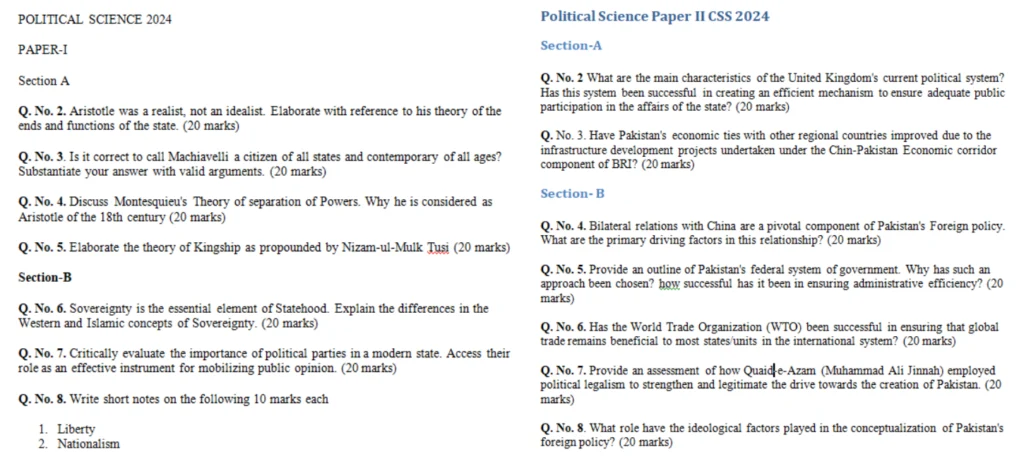Table of Contents
TogglePolitical Science Paper CSS 2024
PAPER-I
Section A
Q. No. 2 Aristotle was a realist, not an idealist. Elaborate with reference to his theory of the ends and functions of the state. (20 marks)
Q. No. 3. Is it correct to call Machiavelli a citizen of all states and contemporary of all ages? Substantiate your answer with valid arguments. (20 marks)
Q. No. 4. Discuss Montesquieu’s Theory of separation of Powers. Why he is considered as Aristotle of the 18th century (20 marks)
Q. No. 5. Elaborate the theory of Kingship as propounded by Nizam-ul-Mulk Tusi (20 marks)
Section-B
Q. No. 6. Sovereignty is the essential element of Statehood. Explain the differences in the Western and Islamic concepts of Sovereignty. (20 marks)
Q. No. 7. Critically evaluate the importance of political parties in a modern state. Access their role as an effective instrument for mobilizing public opinion. (20 marks)
Q. No. 8. Write short notes on the following 10 marks each
(a) Liberty
(b) Nationalism
PAPER-II
Section-A
Q. No. 2 What are the main characteristics of the United Kingdom’s current political system? Has this system been successful in creating an efficient mechanism to ensure adequate public participation in the affairs of the state? (20 marks)
Q. No. 3. Have Pakistan’s economic ties with other regional countries improved due to the infrastructure development projects undertaken under the Chin-Pakistan Economic Corridor component of BRI? (20 marks)
Section- B
Q. No. 4. Bilateral relations with China are a pivotal component of Pakistan’s Foreign policy. What are the primary driving factors in this relationship? (20 marks)
Q. No. 5. Provide an outline of Pakistan’s federal system of government. Why has such an approach been chosen? how successful has it been in ensuring administrative efficiency? (20 marks)
Q. No. 6. Has the World Trade Organization (WTO) been successful in ensuring that global trade remains beneficial to most states/units in the international system? (20 marks)
Q. No. 7. Provide an assessment of how Quaid-e-Azam (Muhammad Ali Jinnah) employed political legalism to strengthen and legitimate the drive towards the creation of Pakistan. (20 marks)
Q. No. 8. What role have the ideological factors played in the conceptualization of Pakistan’s foreign policy? (20 marks)
